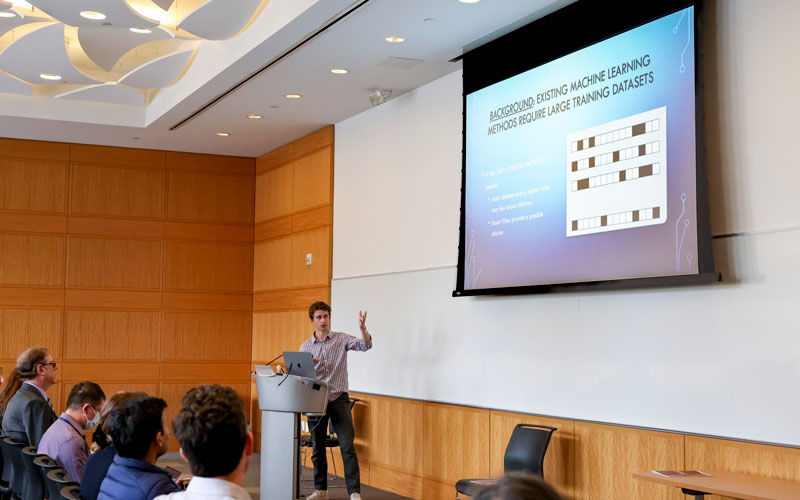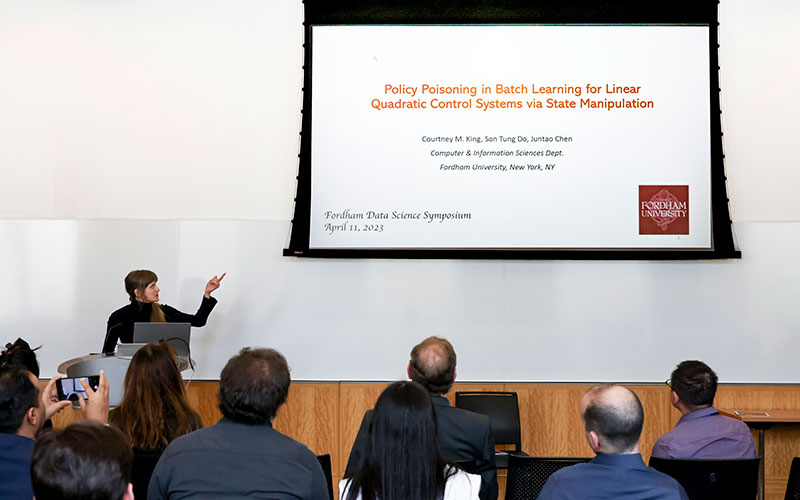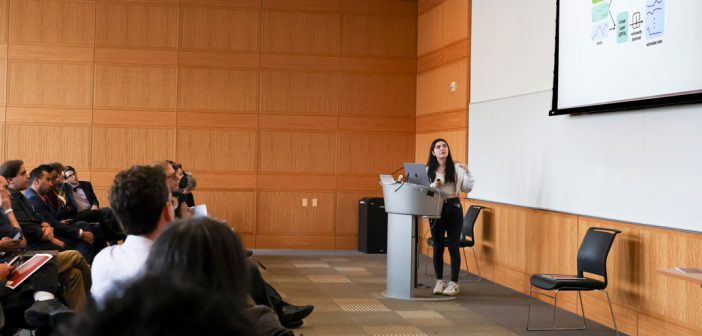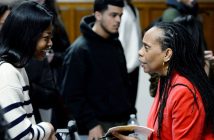“It’s particularly exciting to see how data science is being used to enhance ethically informed and motivated research,” said Ann Gaylin, dean of the Graduate School of Arts and Sciences. “I’m also pleased to note how this research aligns so closely with GSAS’s mission of graduate education for the global good.”
Social Media’s Impact on LGBTQ+ Students
Xiangyu Tao, a fourth-year doctoral student in the applied developmental psychology program, used survey data to illustrate social media’s effects on LGBTQ+ students. She found that the more time the students spent on social media, the more discrimination and hateful language they were exposed to, which caused higher levels of stress, anxiety, and depression.
Tao’s research also found that while LGBTQ+ students reported some positives regarding social media, such as finding a community and resources online, they did not outweigh the negatives. She shared her findings with members of the undergraduate Queer Student Advisory Board who had some insights.
“[A] member brought up that positives that happen on social media fade away when you close your phone, but the negatives on social media, like discrimination, will linger and impact a person’s mental health,” she said.

Xiangyu Tao, a fourth-year doctoral student in the applied developmental psychology program, explains her research into social media’s impacts.
Making Scientific Advancements
Understanding the relationship between brain activity and behaviors is a main focus of neuroscience, said Rabia Gondur, an integrative neuroscience major who graduated from Fordham College at Lincoln Center in 2022 and is currently part of the accelerated master’s program in data science in the Graduate School of Arts and Sciences.
“How do we relate these rich, complex naturalistic behaviors to their simultaneously recorded neural activity? With our research we are trying to answer this question,” she said.
But Gondur noted that oftentimes models for documenting these, are “restricted to only one data modality, so either neural activity or behavior, but usually not in conjunction.”
With Stephen Keeley, an assistant professor of natural sciences, Gondur worked to combine existing models to better show how that conjunction of neural activity and behavior is related. She gave an example of a fly and showed how the model tracked both the neural activity in the brain taking place and what the behavior of the fly was, such as moving its left limb or right limb.
“We hope that [this combined]model can be a general tool for understanding the relationship between the brain and behavior,” she said.

Nolan Chiles, a senior at Fordham College at Rose Hill majoring in integrative neuroscience, explains his research into how algorithms could support future drug discovery efforts.
Nolan Chiles, a senior at Fordham College at Rose Hill majoring in integrative neuroscience, worked with chemistry professor Joshua Schrier to conduct research on a classification algorithm that he hopes, with some additional work, can be used for drug discovery.
“The predominant way that we discover new drugs, say for HIV, [is by trying]to find molecules that are effective in inhibiting infection,” he said.
Traditionally this is done through a method called “High Throughput Screening,” which involves testing many molecules, often blindly, Chiles said, for how effective they are.
“This is often costly and time inefficient, and so we are beginning to find other ways of using computational prescreening so that we can cut down on the number of molecules that we actually have to evaluate in the lab,” he said.
Data Poisoning
Courtney King, a doctoral student in computer science who received her master’s degree in the subject from the Graduate School of Arts and Science in 2022, worked with Juntao Chen, an assistant professor of computer and information sciences, to examine how an “attacker” can manipulate data to make something like a chatbot do something it was not made to do.
King gave the example of the chatbot Tay from Microsoft, which was “not supposed to be able to be taught offensive language,” but “through policy poisoning, Twitter users were able to make her say racist things.”
“Data poisoning is reported as a leading concern for industry applications,” King said.
Their research helped to identify a “potential vulnerability” where an attacker can trick the machine learner into “implementing a targeted malicious policy by manipulating the batch data,” such as a chatbot saying racist phrases. By pointing out this vulnerability, the researchers showed that it is crucial for a system to “actively protect its stored data, and specifically its sensor data, for trustworthy batch learning.” King’s paper stated that future work could include exploring how to detect or protect against this type of attack.

Courtney King, a doctoral student in computer science, describes her research into policy poisoning.
Breadth and Depth of Research
Other presentations included a look into Project FRESH Air and how the citizen science program uses monitors to detect air quality at schools in the Bronx and Manhattan; how functional difficulties, such as vision impairment, can be mapped by region; and how algorithms can be used to identify data vulnerable to ransomware attacks.
Gaylin praised all of the presenters, particularly the graduate students, for their research.
“It’s heartening to see that graduate students in the first cohorts of our two newest programs—the Ph.D. in computer science, and the dual master’s degree in economics and data science—have hit the ground running,” she said. “These students are our future.”



